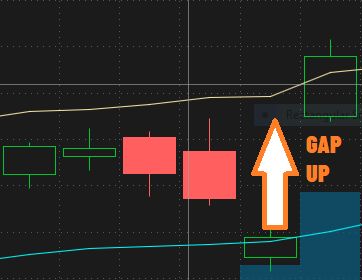Gap Up Meaning - With an Example
Stock Market Guides is not a financial advisor. Our content is strictly educational and should not be considered financial advice.
Sometimes in a conversation about the stock market, you might hear someone say, "the stock gapped up overnight". If you're not sure what exactly that means, then you're in the right place.
This article will explain what the term gap up means in the context of the stock market.
Gap Up Definition
To understand the meaning of the term "gap up", first you need to understand that the US stock market is not open 24 hours a day. There are periods when it is closed and no one can trade stocks.
During those periods when the stock market is closed, sometimes news or events occur that can affect a stock's price. An example of this when a company reports earnings while the stock market is closed.
This can cause pressure on the stock price such that by the time the stock market opens the next day, it can be trading at a different price than it was trading for at the end of the prior day.
With that in mind, here is the formal definition:
In more simple terms, a gap up is when the price of a stock jumps up overnight.
A gap up can be minor or major.
Stock Market Guides

Stock Market Guides identifies stock trading opportunities that have a historical track record of profitability in backtests.
Average Annualized Return
43.1%
Gap Up Example
The image above shows a stock chart for Apple (AAPL). It's a daily chart which means that each of the price bars represents the price activity for one day during normal open stock market trading hours.
A candle that is green means the price went up during normal trading hours for that day. If it's red, it's the opposite and it means the price went down during normal trading hours.
You can see in the image above that the last price bar reflects an opening price that is well above the closing price of the prior day. That is a gap up.
Video About How a Gap Up Works
This video we made about how gap ups work might be helpful:
Who is Affected by a Gap Up?
Anyone who holds a stock or option position overnight can be affected by a gap up. This is referred to as gap risk.
This means that anyone who has long term investments in the stock market can be affected by a gap up. Also, swing traders can be affected by a gap up.
Day traders often close all their positions before the end of the trading day, which makes them unsusceptible to any overnight price changes.
Does a Gap Up Help You?
If you own a stock that gaps up overnight in price, that's typically a good thing. It means your stock position went up in value overnight.
Or if you own a call option where the underlying stock gaps up, it often will have a positive impact on the value of the option.
Sometimes a gap up is relatively minor. These might have a minimal impact on your position's profitability. But occasionally, you can be the beneficiary of really large gap up, and it can be like getting one of those Monopoly cards that says you have received a surprise inheritance!
If you are shorting a stock or own a put option, then a gap up works against you and reduces the value of your position.
Join Our Free Email List
Get emails from us about ways to potentially make money in the stock market.
